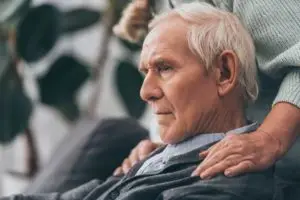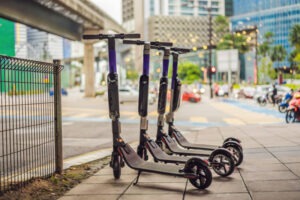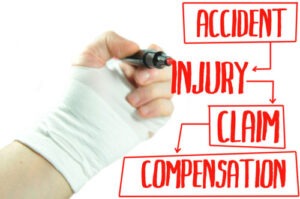
Five Types of Elder Abuse to Look For
The elderly members of society deserve care and respect. Unfortunately, not everyone offers elderly individuals the care they deserve. Whether an elderly loved one lives in a nursing home or assisted living facility or receives care at home, learning that someone has taken advantage of an elderly family member can set your blood to boiling. Worse, when a loved one suffers abuse, that abuse may cause injuries that shorten their lifespan or leave them struggling with a long and painful recovery. That’s when an elder abuse or nursing home neglect and abuse lawyer can help you.
To learn more about your specific case speaking with a lawyer who has dealt with these things before can show you all your legal options. For more information about elder abuse law consider the offices of Viles and Beckman, LLC.


Expect More, Receive More: Legal Support That Feels Like Family
1. Physical Abuse
When you think of elder abuse, physical abuse likely comes to mind first. Physical abuse occurs when someone uses physical force against the elderly individual. In some cases, physical abuse may occur as a result of a power play: it makes the abuser feel powerful to inflict pain on someone else. Physical abuse can include anything that causes pain or the threat of pain; pushing, shoving, hitting, and pinching, for example. The infliction of pain does not have to leave visible injuries to count as physical abuse.
Signs of Physical Abuse
If you notice any of these signs in an elderly loved one, it should raise red flags that prompt you to further investigate the possibility of physical abuse:
- Unexplained bruising. Elderly individuals often bruise more easily than younger people. In general, however, most seniors will have a fairly good idea of where those bruises came from. If you have a senior loved one who has more bruises than usual, but cannot or will not explain where they came from, those bruises might come from physical abuse.
- Excessive injuries. Many elderly individuals lose their sense of balance or coordination as they age, especially if they have medical issues that contribute to the problem. But if your elderly loved one has to go to the hospital frequently for injuries, especially injuries that have no reasonable explanation, you may want to investigate further into the possibility that they are the victim of elder abuse.
- Depression or withdrawal. Many elderly individuals do not want to admit that they are being abused. They may feel shame or embarrassment. Instead of talking about the abuse, they may withdraw. You may also notice signs of depression, anxiety, or belligerence that other illness or injury does not explain.
- Making up stories about how their injuries occurred. While injuries can result even from normal activities, especially as your loved one ages, if your loved one makes up an outlandish or unbelievable story about how an injury occurred, you may want to look further into the possibility of abuse.
- Refusal or lack of desire to spend time with a specific individual. If you notice an elderly loved one withdrawing from a specific individual, including a family member, it may be a sign that the elderly person is suffering from abuse or neglect at that person’s hands.
2. Emotional Abuse
Both verbal and nonverbal abuse can cause extreme emotional distress for an elderly loved one. Emotional abuse can come in a variety of forms: name-calling, derogatory comments about the elderly individual, yelling, or being patronizing, for example. While many elderly individuals may lack the same capacity they had in their prime, especially if they develop symptoms of Alzheimer’s or dementia, they still deserve respect and compassion. An individual who treats an elderly loved one like a child or who considers them a burden may create a sense of shame in the elderly person, causing withdrawal, depression and anxiety, or a feeling of worthlessness.
Signs of Emotional Abuse
Emotional abuse can take more effort to spot than physical abuse, since it does not leave physical evidence or visible injuries behind. In many cases, however, emotional abuse can cause more damage than physical abuse. Look out for:
- Controlling behavior on the part of another family member or caretaker. That family member might treat your elderly loved one like a child, say derogatory things about them in their presence, or refuse to allow other family members access to that person.
- Shaming behaviors. Do you notice a friend or family member constantly shaming or making fun of your elderly loved one when they make mistakes? This might come in the form of lectures, leaving a place abruptly because of a mistake, or blaming the elderly individual for failing to complete certain activities. The abuser might treat the elderly loved one as a burden. In some cases, this individual might insist on taking on more of the duties associated with caring for an elderly loved one to play the victim, emphasizing how hard they struggle to provide that care.
- Isolation. Have you noticed that your elderly loved one no longer receives many visitors or does not seem to attend events that, normally, they would have attended? Does a specific family member control access to an elderly loved one, often insisting they cannot have visitors? This isolating behavior could signify emotional abuse.
- A senior loved one who withdraws. When a senior loved one withdraws from family members or constantly talks about “being a burden,” this could indicate emotional abuse on the part of the elderly person’s primary caregiver.
3. Sexual Abuse
As they age, many seniors note a decrease in physical capability. As a result, they may no longer have the ability to defend themselves against unwanted sexual advances. In some cases, seniors with Alzheimer’s and dementia might not have the capacity to refuse or to share information about the abuse. In others, seniors may hide sexual abuse out of shame.
Sexual abuse occurs any time a caregiver or anyone else forces unwanted sexual contact on the senior. Sexual abuse includes contact with the genitals, breasts, and anus that the senior does not want or ask for. Sexual abuse may also occur if a caregiver takes advantage of a senior who lacks the capacity to say no. A patient with Alzheimer’s or dementia, for example, may not understand the inappropriate nature of sexual contact with a caregiver, but the caregiver certainly understands and should avoid that contact.
Signs of Sexual Abuse
Sexual abuse often occurs against seniors who cannot communicate about that abuse verbally or who will keep quiet out of shame. However, if you notice these symptoms, they could indicate sexual abuse:
- Fear or discomfort around a specific caregiver. In nursing homes, in particular, take note of nurses or staff members whom a senior loved one does not like or does not want to spend time with.
- Unexplained injuries to the genitals. If you notice bruising in the genital area, pelvic injuries, or a senior loved one who has trouble sitting down, these symptoms could indicate sexual abuse.
- Developing an STD. If your loved one suddenly develops an STD, they must have acquired it from somewhere—and may have acquired it from unwanted sexual contact with a caregiver.
- Engaging in unusual and inappropriate sexual activities. A patient with Alzheimer’s or dementia might suddenly start to act out inappropriate sexual fantasies. Any senior might unexpectedly become more sexual in their interactions with others. If you notice these signs of sexual assault, carefully investigate what could have caused them in your loved one’s environment.
- Withdrawal. Some seniors will withdraw after sexual abuse out of a sense of shame.
4. Neglect
Many seniors require increasing care as they age and can no longer take care of themselves the way they could in their younger years. When a primary caregiver, whether a nursing home or family member, fails to provide the care the senior needs, including food, water, and medical care, this is neglect. Often, neglect occurs for a long time without other family members realizing it. Neglect, however, causes a fast decline in many seniors and can cause further medical problems or result in death.
Signs of Neglect
When a senior suffers neglect at the hands of a primary caregiver, you may notice:
- Signs of malnutrition. Some diseases can cause a senior loved one to fail to absorb nutrients properly. In other cases, seniors may choose not to eat for their own reasons; lack of appetite or lack of taste, for example. If malnutrition occurs with no medical reason, however, this could indicate serious neglect on the part of a caregiver.
- Increased symptoms of a supposedly managed medical condition. Many seniors have extensive medical conditions, but often, medications and regular medical care keep those symptoms under control. Sudden lack of symptom control could indicate medical neglect; a caregiver who does not purchase or administer medications, for example.
- Poor hygiene. Caregivers bear responsibility for keeping their elderly charges dressed in clean clothing, bathed, and comfortable. While some seniors may refuse to bathe, especially those with Alzheimer’s or dementia, caregivers should make every effort to help them maintain proper hygiene. If you notice a loved one wearing the same clothes multiple days in a row or failing to bathe regularly, this could indicate neglect on the part of the primary caregiver.
- Signs of loneliness and isolation. In addition to caring for physical needs, caregivers must ensure that seniors receive adequate social interaction. If you notice that your loved one has grown increasingly lonely, this could indicate neglect.
5. Financial Abuse

Signs of Financial Abuse
Many people consider money a private matter and they don’t want to “butt in” or inadvertently step on someone else’s toes. When caring for an elderly loved one, however, you should take careful note of potential signs of financial abuse, such as:
- Needed bills going unpaid despite a loved one’s ability to pay them. You might notice, for example, past due notices in the mailbox or that the power is turned off, even though your loved one should have the money to pay the bills.
- A family member has all of your loved one’s bills go to a different address. Instead of having bills come to your loved one directly, they go to the home of the primary caregiver instead, for example. While this might make it easier to keep up with those bills, it may also make it easier for the caregiver to hide how they spend the money.
- Unexpected money missing from bank accounts. Many financial abusers will demand large financial gifts from elderly individuals. If you notice large withdrawals from the bank with no logical explanation, this could indicate financial abuse.
- Missing property or assets. Many people feel no compunction against stealing from an elderly family member. You might notice that small heirlooms go missing first, things that the elderly individual might not miss quickly. Over time, thefts may advance; larger items going missing, cash going missing from the home, or even assets suddenly transferring ownership.
- Unexplained financial transactions with the same individual. Some people will demand money repeatedly over time, constantly asking for “loans,” for example, or demanding money outright. In some cases, those individuals might claim this payment as their due for providing care or companionship to an elderly individual.
- Mismanagement of your loved one’s assets. When a specific individual gets control of your loved one’s finances, they might, for example, choose to steal those resources rather than take care of things for your loved one.
No matter what type of abuse your loved one has endured, they deserve compensation for their pain and suffering. If you believe a loved one suffered abuse at someone else’s hands, investigate carefully and contact an attorney as soon as possible. If your loved one claims someone is abusing them, always take those allegations seriously and investigate quickly to avoid future abuse.
Fort Myers, FL 33919







